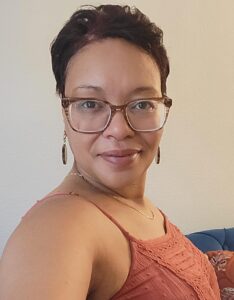By Felicia V. Black
 What happens to Women of Color when we are unable to hold space as BIPOC (Black, Indigenous, and People of Color) facilitators of embodied practice groups?
What happens to Women of Color when we are unable to hold space as BIPOC (Black, Indigenous, and People of Color) facilitators of embodied practice groups?
During a unique time of the COVID 19 global pandemic and national racial unrest and as an educator who is steeped in social and racial justice advocacy within a university space at our nation’s borderlands, I needed a community of support more than ever.
During our time of lockdown, I facilitated Theatre of the Oppressed (T.O.) groups of various configurations on my campus virtual space, and I was committed to supporting women of color. I knew that many of the people who joined in the group would be coming as a way to find a place to explore uncertainty, a space to talk, a space to heal in and to find ways to move toward action.
I found that facilitating these groups was healing for me as a facilitator and member of the Black community. I felt a shared understanding with those that I worked and played with. We had an understanding and knowing; a shared unspoken bond between our collective situations and struggles. So, as I worked to offer support and healing to my community, my community has offered healing and support to me through the T.O. facilitation, which I feel is the foundation of this work.
So, what happens to Women of Color when we are unable to hold space as BIPOC members and facilitators of embodied practice groups? I asked myself this question, because I found myself going from excitement and joy to feelings of despair and hopelessness. The weight of our times caught up with me. I struggled. I felt that I needed support. How could I hold a container, a space for these individuals to come and be seen and heard and understood when I was falling apart? I remember telling my T.O. mentor that I didn’t know if I could carry on with facilitating groups, because I struggled. I was TAPPED OUT! My monthly T.O. Mentorship group was quite unique in that we were all BIPOC women. My companions heard and understood my struggles. They questioned with me. They talked and “played” me through; uplifted me and offered the gifts of their individual strengths.
My experiences confirm the necessity of BIPOC caucus groups in the participation and facilitation of T.O. This leads me as a new practitioner to call on the community for support through this question: What support can we put in place for ourselves so that we can engage with our participants while caring for ourselves in this difficult but necessary work of “on-the-ground” advocacy?
Felicia V. Black is Assistant Professor of Child and Family Development at San Diego State University and a TO practitioner in San Diego, CA, USA. She recently completed the Mandala Center’s Distance Mentorship for TO Practitioners. fblack3@gmail.
